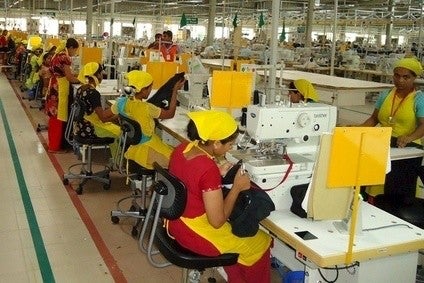
A settlement of US$2.3m has been reached in an arbitration case filed in 2016 against a leading multi-national fashion brand for non-compliance with the Bangladesh Accord on Fire and Building Safety.
Claims were made by unions against the two unnamed global brands that they failed to require suppliers to remediate facilities within the mandatory deadlines imposed by the Accord, and failed to negotiate commercial terms to make it financially feasible for their suppliers to cover the costs of remediation.
One settlement was reached last month. Now, IndustriAll Global Union and Uni Global Union say they have reached a settlement agreement in the second of the two cases to remedy “life-threatening” workplace hazards, in what they say represents one of the largest payments made by a brand to remedy workplace dangers in a supply chain.
Settlement reached in Bangladesh Accord arbitration
The brand, which cannot be named under the terms of the settlement, has agreed to pay $2m towards remediation of more than 150 garment factories in Bangladesh. A further $300,000 will be contributed into IndustriAll and UNI’s joint Supply Chain Worker Support Fund, established to support the work of the global unions to improve pay and conditions for workers in global supply chains.
“This settlement shows that the Bangladesh Accord works,” says IndustriAll’s general secretary, Valter Sanches. “It is proof that legally-binding mechanisms can hold multinational companies to account. We are glad that the brand in question is now taking seriously its responsibility for the safety of its supplier factories in Bangladesh. Their financial commitment serves as an example for other brands to follow.”
Christy Hoffman, UNI Global Union’s deputy general secretary, added: “Under the Accord, brands must shoulder some of the financial responsibility for fixing the Bangladeshi factories that manufacture their products, and this agreement shows that we are actively enforcing these Accord commitments.

US Tariffs are shifting - will you react or anticipate?
Don’t let policy changes catch you off guard. Stay proactive with real-time data and expert analysis.
By GlobalData“The settlement makes real resources available to over 150 factories so they can finally make the necessary repairs that were needed years ago. We will continue pushing to make sure that all brands contribute their fair share to make work safer in Bangladesh.”
The legally-binding five-year Accord commits signatories to independent safety inspections with public reports on all their Bangladeshi suppliers, mandatory repairs and renovations, the obligation by brands to underwrite the costs of safety upgrades, and repercussions for suppliers that refuse to improve conditions including the termination of business. It also binds signatories to maintain sourcing volumes in Bangladesh for two years.
So far, the Accord’s inspectors have completed fire and building safety reviews at 1,800 facilities, which supply more than 200 signatory brands. Accord engineers have identified over 118,500 fire, electrical and structural hazards at these factories.
Around 83% of workplace dangers discovered in the Accord’s original round of inspections have been remediated, and 500 Accord factories have completed 90% or more of the necessary fixes.
A second Accord was signed in June last year, which will go into effect when the original agreement expires in May 2018. However, the group admitted recently that major life-threatening safety concerns remain outstanding in too many of the factories it monitors.




